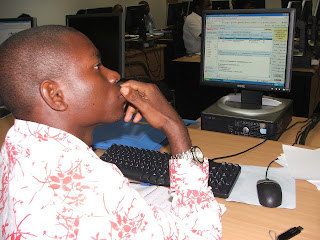 Personal training during the last day of the workshop. From the right Lilian Timbuka, editor of Kiongozi, Edwin Mpokasye from Dar es Salaam School of Journalism and myself. Behind are Abbas El-Sabri from Radio Voice of Quran and Abraham Makinda of Uwazi.
Personal training during the last day of the workshop. From the right Lilian Timbuka, editor of Kiongozi, Edwin Mpokasye from Dar es Salaam School of Journalism and myself. Behind are Abbas El-Sabri from Radio Voice of Quran and Abraham Makinda of Uwazi. Abbas El-Sabri, news editor of Radio Voice of Quran, checking his emails while listening to the facilitator in class.
Abbas El-Sabri, news editor of Radio Voice of Quran, checking his emails while listening to the facilitator in class. Ratifa Baranyikwa, foreign news editor of Tanzania Daima, and Jacqueline Maro, assistant news editor of Radio Upendo, searching information from the internet.
Ratifa Baranyikwa, foreign news editor of Tanzania Daima, and Jacqueline Maro, assistant news editor of Radio Upendo, searching information from the internet. In the front, our tool for fact-finding. In the back, Sekela Moses of Agape TV, Cecilia Mng’ong’o from MISA Tanzania and Jabir Idrissa, editor of Mwanahalisi, with Mawazo Lusonzo, sports editor of Changamoto. Thanks to Albert and Lilian for photos.
In the front, our tool for fact-finding. In the back, Sekela Moses of Agape TV, Cecilia Mng’ong’o from MISA Tanzania and Jabir Idrissa, editor of Mwanahalisi, with Mawazo Lusonzo, sports editor of Changamoto. Thanks to Albert and Lilian for photos. Many thanks to the TGDLC catering staff for the plentiful food which was always there when we went for break. Here’s Ratifa enjoying a mixture of stews and rice. Thanks to Maggid for sharing the picture.
Many thanks to the TGDLC catering staff for the plentiful food which was always there when we went for break. Here’s Ratifa enjoying a mixture of stews and rice. Thanks to Maggid for sharing the picture.For workshop participants’ last postings from Friday, November 14, please go to the links to their own blogs on the right.
Thanks to everyone in the group for being so active, attentive and encouraging. Let’s keep in touch and continue to network. Kazi njema.





